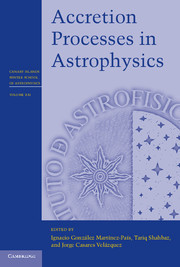Description
Accretion Processes in Astrophysics
Canary Islands Winter School of Astrophysics Series
Coordinators: González Martínez-País Ignacio, Shahbaz Tariq, Casares Velázquez Jorge
This volume presents a comprehensive and up-to-date introduction to the major topics associated with accretion processes in astrophysics.
Language: English
Subject for Accretion Processes in Astrophysics:
Publication date: 02-2014
314 p. · 17.8x25.4 cm · Hardback
314 p. · 17.8x25.4 cm · Hardback
Description
/li>Contents
/li>Biography
/li>
It has been more than fifty years since the first significant paper on accretion flows was written. In recent years, X-ray satellites capable of identifying accretion disks and radiation jets - indications that accretion has taken place - have significantly advanced our understanding of these phenomena. This volume presents a comprehensive and up-to-date introduction to the major theoretical and observational topics associated with accretion processes in astrophysics. Comprising lectures presented at the twenty-first Winter School of the Canary Islands Institute of Astrophysics, the text emphasises the physical aspects of accretion, investigating how radiation jets are produced, how accretion power is divided between jets and radiated energy, the geometry of accretion flow, and the accretion processes of active galactic nuclei. Written by an international team of experienced scientists, chapters offer young researchers key analytical tools for supporting and carrying out the next generation of front-line research.
List of contributors; List of participants; Preface; Acknowledgments; Abbreviations; 1. Accretion disks Henk Spruit; 2. The evolution of binary systems Philipp Podsiadlowski; 3. Accretion onto white dwarfs Brian Warner; 4. Accretion in X-ray binary systems Robert I. Hynes; 5. X-ray binary populations in galaxies Giuseppina Fabbiano; 6. Observational characteristics of accretion onto black holes I Chris Done; 7. Observational characteristics of accretion onto black holes II Rob Fender; 8. Computing black hole accretion John F. Hawley; Appendix: Piazzi Smyth, the Cape of Good Hope, Tenerife and the siting of large telescopes Brian Warner.
Ignacio González Martínez-País is Lecturer at the Astrophysics Department of La Laguna University and Staff Researcher at the Institúto de Astrofísica de Canarias. His main research interests include the study of compact binaries in which accretion takes place: cataclysmic variables (harbouring a white dwarf as the accreting object) and X-ray binaries (harbouring a neutron star or black hole). He has extensive experience teaching related subjects such as general physics, fluid mechanics, differential equations, astrophysical instrumentation, observational techniques and accretion processes.
Tariq Shahbaz is Staff Scientist at the Institúto de Astrofísica de Canarias, where his research focuses on the study of compact objects, such as neutron stars and black holes, and determining their masses by developing methods to model the observed lightcurves and spectra. His other research interests include high time resolution phenomena and X-ray binaries. He is a member of the International Astronomical Union.
Jorge Casares Velázquez is Staff Scientist at the Institúto de Astrofísica de Canarias. His research focuses on the study of galactic black holes, with emphasis on the determination of their dynamical masses. He has promoted novel strategies for deriving fundamental parameters in X-ray binaries by exploiting the reprocessing of X-rays into optical line radiation. His other research interests include the study of gamma-ray binaries, cataclysmic variables and millisecond pulsars. He is a member of the International Astronomical Union and the Spanish Astronomical Society.
Tariq Shahbaz is Staff Scientist at the Institúto de Astrofísica de Canarias, where his research focuses on the study of compact objects, such as neutron stars and black holes, and determining their masses by developing methods to model the observed lightcurves and spectra. His other research interests include high time resolution phenomena and X-ray binaries. He is a member of the International Astronomical Union.
Jorge Casares Velázquez is Staff Scientist at the Institúto de Astrofísica de Canarias. His research focuses on the study of galactic black holes, with emphasis on the determination of their dynamical masses. He has promoted novel strategies for deriving fundamental parameters in X-ray binaries by exploiting the reprocessing of X-rays into optical line radiation. His other research interests include the study of gamma-ray binaries, cataclysmic variables and millisecond pulsars. He is a member of the International Astronomical Union and the Spanish Astronomical Society.
© 2024 LAVOISIER S.A.S.




